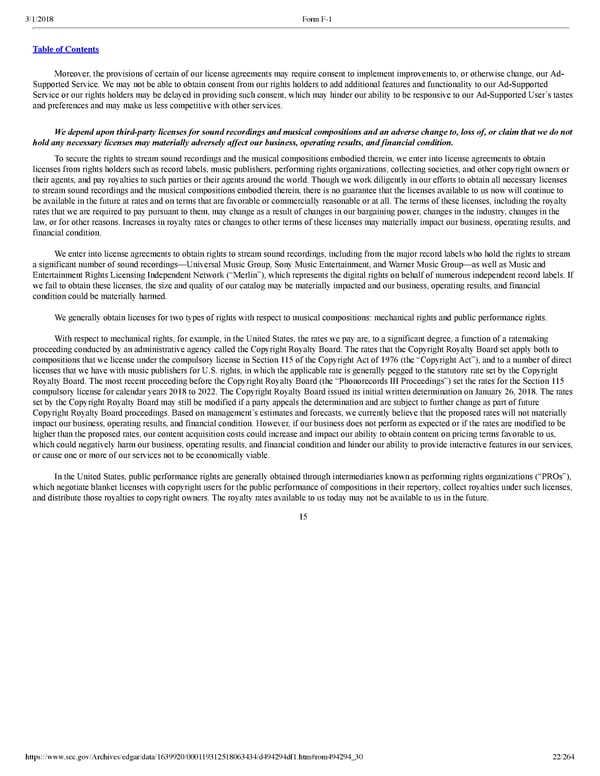22/264 Moreover, the provisions of certain of our license agreements may require consent to implement improvements to, or otherwise change, our Ad Supported Service. We may not be able to obtain consent from our rights holders to add additional features and functionality to our AdSupported Service or our rights holders may be delayed in providing such consent, which may hinder our ability to be responsive to our AdSupported User’s tastes and preferences and may make us less competitive with other services. We depend upon thirdparty licenses for sound recordings and musical compositions and an adverse change to, loss of, or claim that we do not hold any necessary licenses may materially adversely affect our business, operating results, and financial condition. To secure the rights to stream sound recordings and the musical compositions embodied therein, we enter into license agreements to obtain licenses from rights holders such as record labels, music publishers, performing rights organizations, collecting societies, and other copyright owners or their agents, and pay royalties to such parties or their agents around the world. Though we work diligently in our efforts to obtain all necessary licenses to stream sound recordings and the musical compositions embodied therein, there is no guarantee that the licenses available to us now will continue to be available in the future at rates and on terms that are favorable or commercially reasonable or at all. The terms of these licenses, including the royalty rates that we are required to pay pursuant to them, may change as a result of changes in our bargaining power, changes in the industry, changes in the law, or for other reasons. Increases in royalty rates or changes to other terms of these licenses may materially impact our business, operating results, and financial condition. We enter into license agreements to obtain rights to stream sound recordings, including from the major record labels who hold the rights to stream a significant number of sound recordings—Universal Music Group, Sony Music Entertainment, and Warner Music Group—as well as Music and Entertainment Rights Licensing Independent Network (“Merlin”), which represents the digital rights on behalf of numerous independent record labels. If we fail to obtain these licenses, the size and quality of our catalog may be materially impacted and our business, operating results, and financial condition could be materially harmed. We generally obtain licenses for two types of rights with respect to musical compositions: mechanical rights and public performance rights. With respect to mechanical rights, for example, in the United States, the rates we pay are, to a significant degree, a function of a ratemaking proceeding conducted by an administrative agency called the Copyright Royalty Board. The rates that the Copyright Royalty Board set apply both to compositions that we license under the compulsory license in Section 115 of the Copyright Act of 1976 (the “Copyright Act”), and to a number of direct licenses that we have with music publishers for U.S. rights, in which the applicable rate is generally pegged to the statutory rate set by the Copyright Royalty Board. The most recent proceeding before the Copyright Royalty Board (the “Phonorecords III Proceedings”) set the rates for the Section 115 compulsory license for calendar years 2018 to 2022. The Copyright Royalty Board issued its initial written determination on January 26, 2018. The rates set by the Copyright Royalty Board may still be modified if a party appeals the determination and are subject to further change as part of future Copyright Royalty Board proceedings. Based on management’s estimates and forecasts, we currently believe that the proposed rates will not materially impact our business, operating results, and financial condition. However, if our business does not perform as expected or if the rates are modified to be higher than the proposed rates, our content acquisition costs could increase and impact our ability to obtain content on pricing terms favorable to us, which could negatively harm our business, operating results, and financial condition and hinder our ability to provide interactive features in our services, or cause one or more of our services not to be economically viable. In the United States, public performance rights are generally obtained through intermediaries known as performing rights organizations (“PROs”), which negotiate blanket licenses with copyright users for the public performance of compositions in their repertory, collect royalties under such licenses, and distribute those royalties to copyright owners. The royalty rates available to us today may not be available to us in the future. 15
 Spotify F1 | Interactive Prospectus Page 21 Page 23
Spotify F1 | Interactive Prospectus Page 21 Page 23